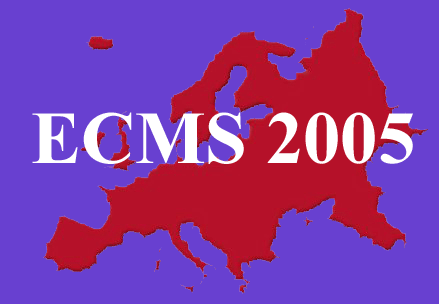
ON MODELLING AND SIMULATION
(formerly referred to as ESM 2005)
| Simulation in wider Europe |

June 1st - 4th, 2005
Riga, Latvia
Keynote and
Plenary Speakers
Tutorials

Keynote Speaker
Prof. Bernd Schmidt
University of Passau
Chair for Operations Research
Innstrasse 33
E-mail: schmidtb@fmi.uni-passau.de
HUMAN FACTORS IN COMPLEX SYSTEMS -
THE MODELLING OF HUMAN BEHAVIOUR
Agents are virtual human beings. They are designed to
imitate or model human behaviour.
Human behaviour is complex and many-sided. Nevertheless it is possible to
argue that human behaviour can within limits be modelled and can thus be
made comprehensible and predictable. Physical, emotional, cognitive and social factors occur in all forms of
human behaviour. Approaches which regard human beings exclusively as
rational decision makers are of limited value.
The modelling of human behaviour plays an important role in all areas in
which action planning, decision making, social interacting and suchlike
play a part.
These areas include in particular:
Economics Production and logistics
Psychology Organisation and administration
Sociology Teaching and education
Plenary Speaker
Prof. Jerzy W. Rozenblit
The University of Arizona
Dept. of Electrical and Computer Engineering
E-mail:
jr@ece.arizona.edu
Cognitive
Computing:
Principles, Architectures, and Applications
The
objectives of this presentation are threefold:
a) to discuss conceptual foundations of cognitive computing,
b) to demonstrate their impact on intelligent systems design, and
c) to present a brief summary of relevant project experiences.
We will begin with an introduction to knowledge-based and cognitive systems; explain their origins and principles. Then, an agent metaphor will be introduced as the basis for design of high autonomy, cognitive architectures that have the ability to achieve objectives, to adapt to environmental changes, and to develop their own goals. Modeling and simulation plays a pivotal role in facilitating the design of such high autonomy architectures. Thus, we will discuss simulation modeling concepts that are essential in cognitive computing.
Projects from both industry and research laboratories that leverage from the above concepts will be discussed. Some recent work that focuses on decision making in complex, information rich environments, multi-agent gaming models, and implementation of symbolic representation techniques in highly flexible, reusable, object-oriented visualization systems will be presented.
Tutorial
Modelling, Simulation and Visualisation for Logistics Process Design
Dr. Gaby Neumann, Otto-von-Guericke-University of Technology
Jochen Bernhard, Fraunhofer Institute for Material Flow and Logistics
Magdeburg, Germany
Tutorial main topics:
- Requirements for and procedure of logistics process design
- Why there is a need for the process-oriented instead of system-oriented focus
- Basic materials flow operations (e.g. storing, moving, assembling, packaging, identifying) as building blocks to design logistics processes
- Standard logistics processes and typical input data relevant for model-based analysis
- Methodologies for modelling logistics processes: process chain, principle animation, discrete event simulation and VRML visualization (incl. practical examples)
- Mapping and matching the different logistics process models theoretical background and implementation)
- Information acquisition for the modeling and simulation of large logistics networks; procedure of information acquisition; quality and granularity of adequate information and data; taxonomy of visualization techniques for the selection of relevant and useful visualization techniques during the information acquisition process; taxonomies for the selection of data collection and statistical analysis methods.
Page created by M.-M. Seidel Last update 18-03-05.
© Copyright ECMS - All Rights Reserved

